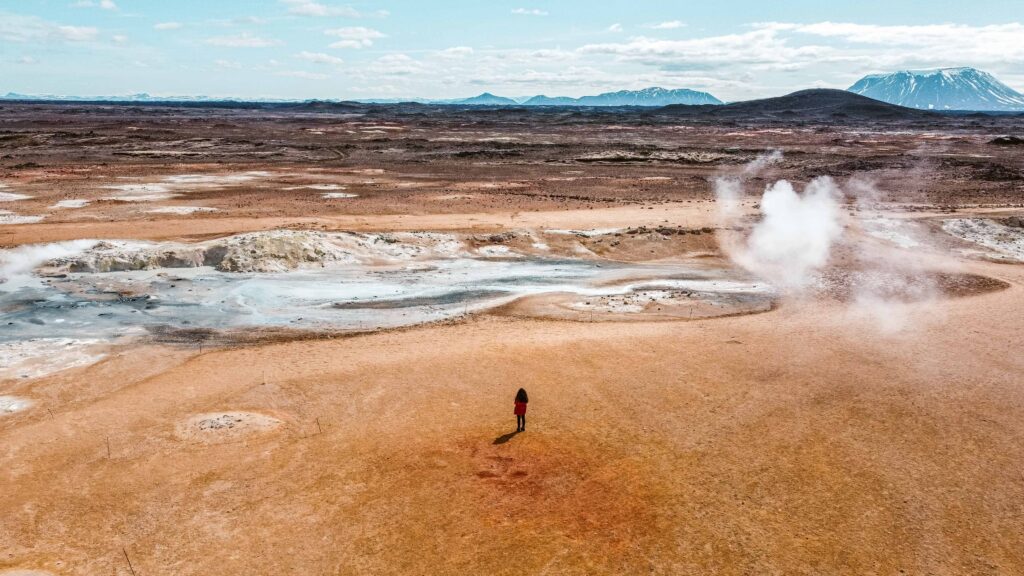VISITEZ LA Islande
Connue sous le surnom de « Terre du feu et de la glace » (et du vent, j'ajouterais !), l'Islande est célèbre pour ses paysages exceptionnels
Monnaie
kr - Icelandic krona (1000kr≃ 6,5€ ≃ 7$ ≃ 5,7£)
POPULATION
393 000
LANGUE
Islandais
SUPERFICIE
102,775 km²
FUSEAU HORAIRE
UTC
DRAPEAU
🇮🇸
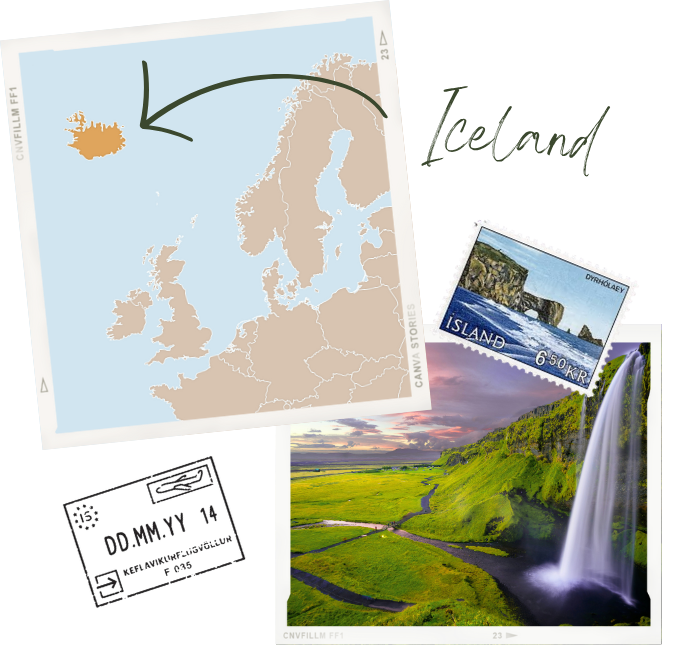

PARTEZ PLUSIEURS JOURS EN ROAD TRIP
La 'Ring Road' ou 'Route 1' est une route nationale qui fait le tour complet du pays, avec une longueur de 1322 km. Conduire sur cette route est, de loin, l'un des meilleurs moyens de découvrir l'Islande.

PROMENEZ-VOUS À REYKJAVIK
Des cafés confortables, des clubs animés, des pubs accueillants et des maisons en rangée en bois colorées abondent à Reykjavik. Abritant un tiers de la population du pays, cette ville est pleine de vie.

ADMIREZ DES PLAGES UNIQUES AU MONDE
Certaines plages islandaises présentent du sable noir en raison du sable écrasé par la roche volcanique noire créée lorsque la lave se refroidit et se solidifie. L'exemple le plus célèbre est la plage de Reynisfjara - illustrée ci-dessus.

PRENEZ LA ROUTE DU CERCLE D'OR
Ce célèbre itinéraire, réalisable en une journée, passe par le parc national de Thingvellir, la zone géothermique de Geysir et la cascade de Gullfoss, trois des sites naturels les plus connus d'Islande.

REJOIGNEZ UNE CROISIÈRE D'OBSERVATION DES BALEINES
Les meilleurs endroits pour se joindre à des excursions d'observation des baleines sont Husavik ou la péninsule de Snaefellsnes, bien que des excursions soient également disponibles depuis la capitale Reykjavik.

PARTEZ À LA CHASSE AUX CASCADES
L'une des caractéristiques les plus reconnaissables de l'Islande est la quantité impressionnante de chutes d'eau à travers le pays.

EXPLOREZ LA PÉNINSULE DE SNAEFELLSNES
Cette péninsule - facilement accessible toute l'année - est comme un "best-of" de ce que l'Islande a à offrir : champs de lave, cascades, sources chaudes, plages de sable noir et doré et de nombreuses possibilités d'observation de la faune sauvage.

RANDONNEZ DANS LA RÉGION DE MYVATN
Mývatn est une petite région du nord de l'Islande, du nom d'un lac volcanique, présentant une impressionnante diversité de paysages : lac volcanique, sources chaudes, zone géothermique, cratères et champs de lave.
Pick an Icelandic destination

Reykjavik
World’s northernmost capital, known for its quirky charm and geothermal spas.
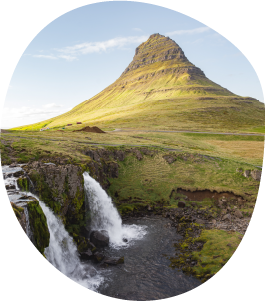
Snæfellsnes
Peninsula dubbed “Iceland in Miniature,” with volcanoes, lava fields, and coastal villages.

Golden Circle
Iconic circular 300 km route from Reykjavik passing through 3 main attractions

Mývatn
Volcanic lake region in North Iceland, known for geothermal wonders and alien-like landscapes.
All articles about Iceland
Prepare your trip to Iceland
💡 Why visit Iceland?
Iceland is a land of fire and ice, where glaciers meet volcanoes and waterfalls crash into black sand beaches. The country offers extraordinary natural wonders, from the Northern Lights et une geothermal lagoons to dramatic landscapes that seem otherworldly. Despite its relatively small size, Iceland delivers unforgettable road trips, rich folklore, and a strong sense of adventure.
🪪 Do I need a visa to visit Iceland?
Iceland is part of the Schengen area. Citizens of the EU, USA, Canada, Australia, and many other countries can enter visa-free for up to 90 days within a 180-day period. However, some nationalities do require a visa. It’s best to check with the nearest Icelandic embassy or consulate for the most up-to-date information specific to your situation.
INFORMATION IMPORTANTE: Les informations ci-dessous sont fournies à titre indicatif et s'appliquent uniquement aux visas de tourisme de courte durée. purposes only. Before your trip to Iceland, or if you are planning to come to Iceland for another purpose (work, studies, …), check the official information on the European Commission website’s page about Schengen visa application: https://www.home-affairs.ec.europa.eu/
⏳ Visa-free but limited to maximum 90 days for a period of 180 days if you are a citizen of one of the following countries: Albanie; Andorre; Antigua-et-Barbuda; Argentine; Australie; Autriche; Bahamas ; Bahreïn ; Barbade ; Belgique; Bosnie Herzégovine; Brésil; Brunéi ; Bulgarie; Canada; Chili; Chine; Colombie; Costa Rica; Croatie; Chypre; Tchéquie ; Danemark; Dominique ; Le Salvador; Estonie; Finlande; France; Géorgie; Allemagne; Grèce; Grenade ; Guatemala; Honduras; Hong Kong; Hongrie; Islande; Irlande; Israël; Italie; Japon; Kiribati ; Koweit; Lettonie; Liechtenstein ; Lituanie; Luxembourg, Macao ; Malaisie; Malte; Iles Marshall; Maurice ; Mexique; Micronésie; Moldavie; Monaco; Monténégro; Pays-Bas; Nouvelle-Zélande; Nicaragua; Macédoine du Nord; Norvège; Oman; Palaos ; Panama; Paraguay ; Pérou; Pologne; Le Portugal; Qatar; Roumanie; Saint-Christophe-et-Niévès; Sainte-Lucie; Saint-Vincent-et-les-Grenadines; Samoa ; Saint Marin; Serbie; Les Seychelles; Singapour; Slovaquie; Slovénie; Iles Salomon; Corée du Sud; Espagne; Suède; Suisse; Taïwan; Timor oriental ; Tonga ; Trinité-et-Tobago; Turquie; Tuvalu; Emirats Arabes Unis; Royaume-Uni; États-Unis d'Amérique; Uruguay; Vanuatu; Vatican; Venezuela
🛂 Visa required if you are a citizen of one of the following countries: Afghanistan ; Algérie; Angola; Arménie; Azerbaïdjan; Bahreïn ; Bengladesh ; Biélorussie ; Bélize ; Bénin ; Bhoutan; Bolivie; Bostwana ; Burkina Faso; Burundi; Cambodge; Cameroun; Cap-Vert; République centrafricaine; Tchad; Chine; Comores ; Congo; Congo (Rép. Dém.); Côte d'Ivoire (Côte d'Ivoire); Cuba; Djibouti; République dominicaine; Équateur; Egypte; Guinée Équatoriale; Érythrée ; Eswatini ; Ethiopie; Fidji ; Gabon; Gambie; Ghana; Guinée; Guinée-Bissau ; Guyane; Haïti; Inde; Indonésie; Iran; Irak; Jamaïque; Jordan; Kazakhstan; Kenya; Kosovo; Koweit; Kirghizistan ; Laos; Liban; Lesotho; Libéria; Libye; Madagascar; Malawi; Maldives; Mali; Mauritanie ; Mongolie; Maroc; mozambicain ; Birmanie ; Namibie ; Nauru ; Népal; Niger; Nigeria; Corée du Nord; Oman; Pakistan; Palestine; Papouasie Nouvelle Guinée; Philippines ; Qatar; Russie; Rwanda; Sao Tomé et Principe ; Arabie Saoudite; Sénégal; Sierra Leone; Somalie; Afrique du Sud; Soudan du sud; Sri Lanka; Soudan; Surinam ; Syrie; Tadjikistan ; Tanzanie; Thaïlande; Togo; Tunisie; Turquie; Turkménistan; Ouganda; Ouzbékistan; Vanuatu; Vietnam ; Yémen; Zambie; Zimbabwe
⛅ When is the best time to visit Iceland?
❄️ December – February: Winter is cold and dark but magical, offering the best chances to see the Northern Lights. Snow-covered landscapes are ideal for winter photography and glacier excursions. Temperatures in Reykjavik range from -1°C (30°F) to 4°C (39°F).
🌱 March – May: Spring brings longer days and melting snow. Roads start reopening, and it’s a good time for quieter travel before summer crowds. Wildlife watching, including puffins and whales, begins in late spring.
☀️ June – August: Summer offers the warmest weather and nearly 24-hour daylight, especially in June. Temperatures range from 9°C (48°F) to 15°C (59°F). It’s peak tourist season, with full road access and countless outdoor activities, from hiking to hot springs.
🍂 September – November: Autumn brings golden colors, fewer tourists, and the return of darkness for Northern Lights viewing. Weather becomes more unpredictable, and some mountain roads start closing due to snow.
🚉 How to get around Iceland?
Getting around Iceland requires a bit of planning due to its remote nature:
🚌 Buses: Long-distance buses operate between main towns during summer and shoulder seasons. However, public transportation is limited, especially in rural areas. Reykjavik has a decent city bus system.
🚂 Trains: Iceland does not have a railway system.
🚗 Car Rental: Renting a car is the most popular way to explore the country. The Ring Road (Route 1) circles the island and is well-maintained, but gravel roads and F-roads (mountain roads) require 4WD. Always check road and weather conditions before driving. An International Driving Permit (IDP) is not required if your license is in Latin script.
💳 Can I use bank cards or cash for payments in Iceland?
Iceland is an almost completely cashless society. Credit and debit cards (especially Visa and Mastercard) are accepted everywhere, even at gas pumps and small shops. There’s little need to carry cash, though ATMs are available.
🔌 What type of plugs and voltage does Iceland use?
Iceland uses plug types C and F, both with two round pins. The standard voltage is 230V and the frequency is 50Hz.
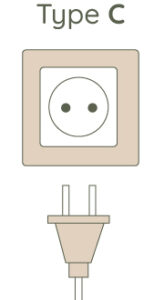
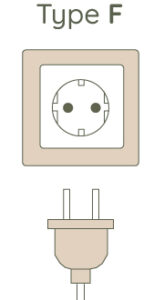
If needed, you can order an universal travel plug adapter here.
🪙 Is tipping customary in Iceland?
Tipping is not expected in Iceland. Service charges are included in the price. However, leaving a small tip for good service is always appreciated.
🥛 Is it safe to drink tap water in Iceland?
Tap water is safe to drink throughout Iceland.
📅 When are public holidays and store closing days in Iceland?
In Iceland, some stores are closed on Sundays. There are 9 jours fériés nationaux in Iceland:
- New Year’s Day (January 01)
- Maundy Thursday, Good Friday et une Easter Monday (dates vary)
- Labour Day (1er Mai)
- Independence Day (17 Juin)
- Commerce Day (first Monday in August)
- Christmas Day (December 25)
- New Year’s Eve (31 Décembre)
Ces jours-là, la plupart des entreprises et des bureaux seront fermés, et de nombreuses attractions peuvent être fermées ou avoir des heures d'ouverture limitées.
🚦 What are the speed limits in Iceland?
In Iceland, traffic drives on the right-hand side of the road. The main speed limits are as follows:
- 50 kph / 30 mph in urban areas
- 80 kph / 50 mph on gravel rural areas
- 90 kph / 56 mph on paved rural areas
During adverse weather (rain, fog, etc.), the speed limits are lowered.
💬 What are some basic Icelandic words I should know?
- Hello (informal) = Halló
- Good day = Góðan daginn
- Goodbye = Bless
- Yes = Já
- No = Nei
- Thank you = Takk
- Please = Vinsamlegast
- You’re welcome = Gerðu svo vel
- Excuse me = Afsakið
- Day = Dagur
- Night = Nótt
- Good evening = Gott kvöld
- Goodnight = Góða nótt
- Mister = Herra
- Ma’am = Frú
- Street = Gata
- Road = Vegur
💡 Tip: With the GoogleTranslate app, you can download the Icelandic language to use it even offline!
🛡️ Is it safe to travel in Iceland?
Iceland is one of the safest countries in the world. Crime rates are very low, and the healthcare and emergency systems are excellent. The main risks come from unpredictable weather and nature-based hazards, so always follow local advice:
Secure Your Belongings: Petty theft is rare, but basic precautions are wise.
Emergency Numbers: Dial 112 for police, fire, or medical emergencies anywhere in Iceland.

